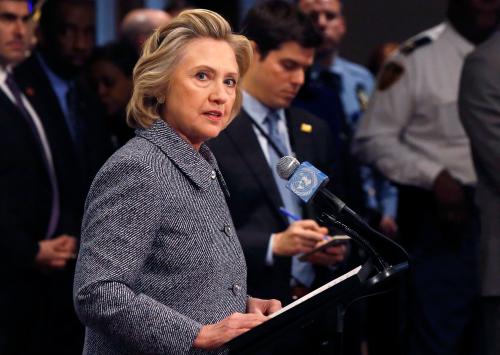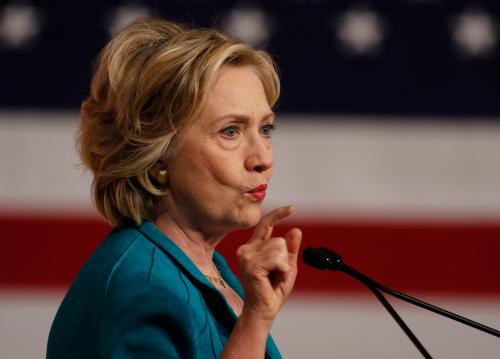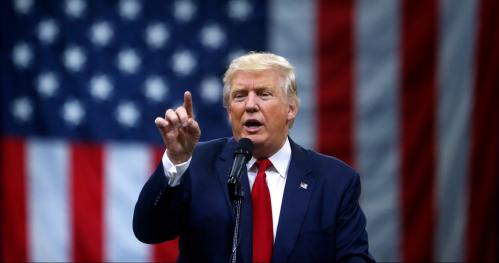Note: FBI Director James Comey recommended this week that no criminal charges be pressed against presumptive Democratic presidential nominee Hillary Clinton for her use of a private email server while she was secretary of state. And Attorney General Loretta Lynch has formally closed the Department of Justice’s investigation. But congressional Republicans—who called Comey to testify before the House Oversight committee yesterday—insist that Clinton’s conduct jeopardized U.S. national security.
As I wrote back in February, when it was revealed that 22 of the emails in question were deemed too classified to be made public: “Hillary’s emails (even if they were released) could not do anything more than confirm or repudiate what has already been widely investigated.” I called for distinguishing mistakes from crimes and argued that Clinton’s use of a private email server never put America’s security at risk.
Due to the renewed relevance of that post, it is re-posted below.
What to make of the recent report that 22 emails from Hillary Clinton’s private server, written while she was secretary of state during the first Obama term, contain such highly classified material that they cannot be released to the public? Republicans have seized on the latest news to argue that Hillary Clinton was careless or even reckless in her treatment of national secrets. They’ve thereby challenged her credentials and judgment as she pursues the presidency.
Clinton has acknowledged some mistakes in the use of a personal email account and server when she led the State Department, but her campaign has dismissed the latest news as evidence of a U.S. government classification system run amok that often slaps a top secret label on even the most innocuous of information.
With the emails at issue now classified, it’s hard to understand the basis for this dispute very well. Who are we to believe? Most people are probably falling back on their preconceived views about Hillary, but it would be nice to find a more objective way to assess the latest news—especially as primary voting season begins.
A hypothetical
I can’t be sure what’s going on here either. But there have been reports that some of the sensitive emails might have involved the use of drones in certain parts of the world where the U.S. government has chosen not to announce or publicize its use of that technology.
Let’s explore that, on the hunch that it may be what’s behind the latest brouhaha. For years, there has been a great deal of media coverage of how unmanned aerial systems, including armed ones, have been used in the broader war on terror. If there ever were any real secrets here, they have been very badly kept. Certainly, Hillary’s emails (even if they were released) could not do anything more than confirm or repudiate what has already been widely investigated, in this country and around the world. It seems quite unlikely that she was so careless as to describe any technical aspects of those drones or to otherwise risk the leakage of information that was truly still secret (in the sense that word is normally used in the English language, rather than the way the U.S. government employs it when making classification determinations).
Hillary’s emails (even if they were released) could not do anything more than confirm or repudiate what has already been widely investigated.
Imagine a situation in which the United States government wished to use force as part of a broader military operation that Congress had already approved in broad contours, going back to the 2001 Authorization on the Use of Military Force that followed the 9/11 attack. But the employment of force in a particular place was seen as politically sensitive—less so in the United States, where Congress had already authorized the conflict, but in a foreign country, where the government at issue was not willing or able to publicly support America’s use of military force on its territory. This could be a situation where the foreign government in question actually had few qualms about the U.S. action, but did still not wish to be associated with them—in fact, it may have wanted the license to complain about them publicly, both to its own public and other nations. It wanted, in other words, to have its cake and eat it too.
In this situation, whether the U.S. decision to accept such constraints on its action was wise or not, it would not be allowable for an American public official to discuss the policy. The actual use of armed force would occur through covert elements of the U.S. government, and under domestic laws governing such activities.
We would have twisted ourselves into knots to avoid displeasing a foreign government that otherwise might make a huge stink about our using American military power on its territory—and might even retaliate against us in some way if the information were publicly confirmed. Everyone in that country, the United States, and other places would have a strong suspicion of what we were actually doing, but there would be no official confirmation. It’s not exactly plausible deniability. Call it implausible deniability, in fact.
In such a situation, as a top official in the United States, Hillary Clinton would perhaps have been an architect of the policy (or have inherited it from a previous presidency). Either way, she would be expected to abide by it, and treat the information as highly sensitive. If she did not do so, that was indeed a mistake on her part.
Distinguishing mistakes from crimes
But if this thought experiment bears any resemblance to what actually is behind those 22 emails, one more thing should also be clear—no major national secret was at risk of getting out because of Secretary Clinton’s misjudgment. Her email practice was potentially a mistake, but no high crime, and America’s security was never put at risk.
Of course, it’s still up to voters to decide how to weigh this potential issue in the panoply of so many others that influence their choices for president. Even if I’m right in my guess about what’s going on here, I don’t claim to be in a position to answer that question for anyone.
The Brookings Institution is committed to quality, independence, and impact.
We are supported by a diverse array of funders. In line with our values and policies, each Brookings publication represents the sole views of its author(s).








Commentary
Clinton’s emails don’t jeopardize U.S. security
July 8, 2016